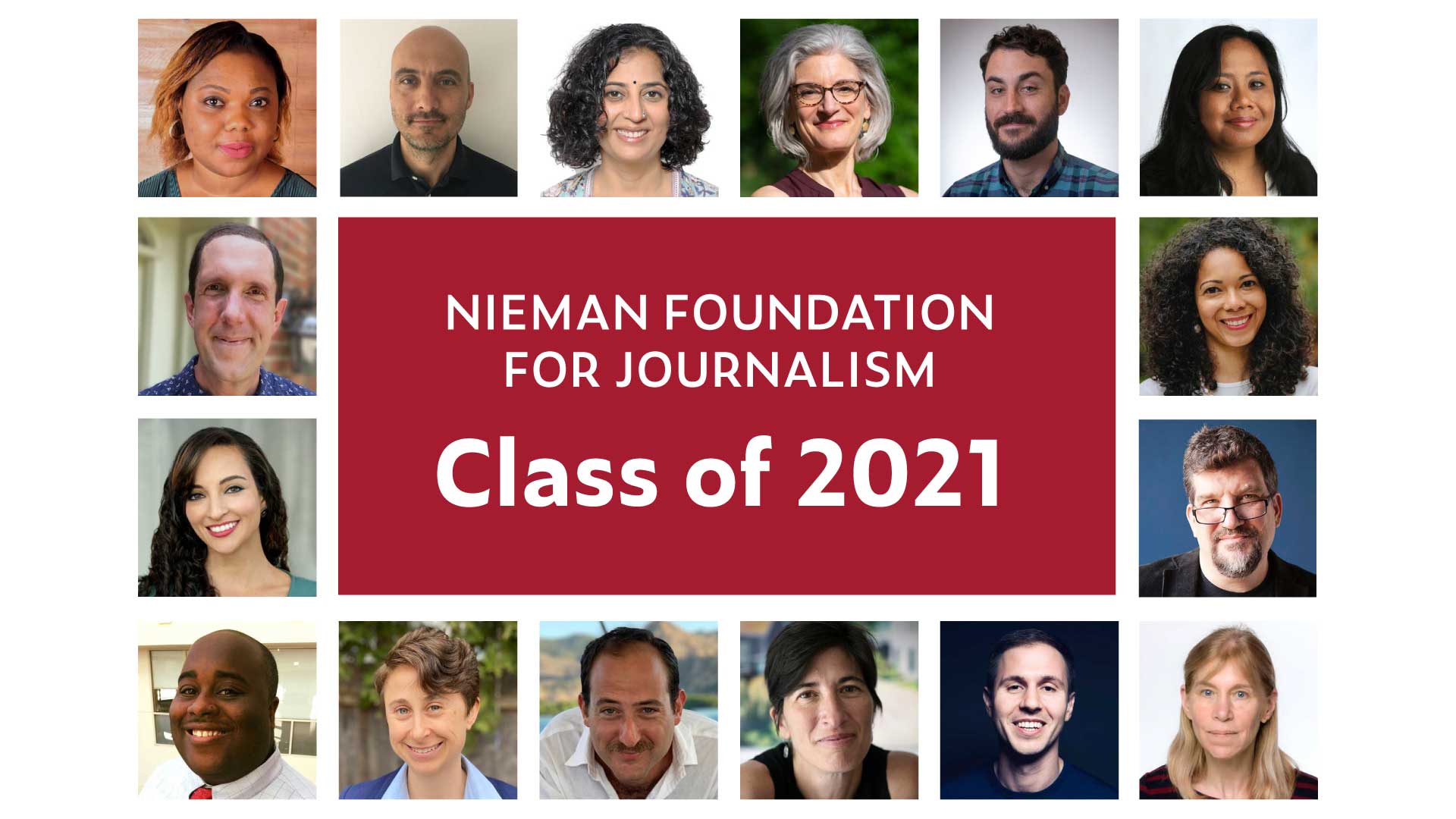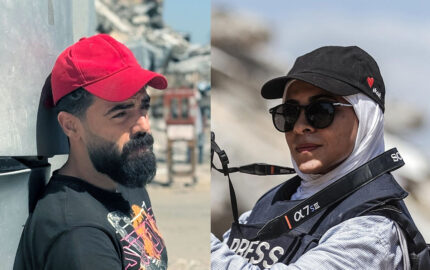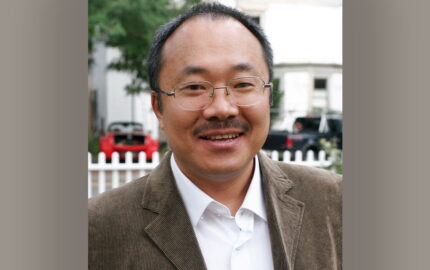Cambridge, Mass. – In a period of unprecedented challenges for journalism, Harvard University’s Nieman Foundation has selected an innovative and distinguished group of journalists for its 2020-21 fellowship class and has created new visiting fellowships to address racial justice and public health.
Nieman, a center for internationally recognized journalism fellowships, publications and programs, has selected 16 Nieman Fellows for its 83rd class, including investigative reporters, science journalists, editors, television and radio producers, a critic, a columnist and newsroom executives working across all media platforms.
Due to Harvard campus restrictions related to the COVID-19 pandemic, the academic-year fellows will begin their fall studies online. The university and Nieman are preparing classes and programming that utilize Harvard’s vast academic and creative resources and take advantage of the interactive capabilities of distance learning.
In addition, Nieman will offer remote visiting fellowships this coming year in support of projects that address racial justice and public health in the U.S., dual challenges underscored by the growing anti-racism movement and the global coronavirus pandemic.
This special initiative, designed to complement our yearlong fellowship program, will offer targeted research opportunities and specialized training to individuals in the U.S. with innovative ideas to advance the representation of journalists of color throughout the news industry; improve coverage of underreported stories and communities; explain the impact of coronavirus on an area or group; or enhance reporting expertise and coverage of public health. Learn more about the visiting fellowship and view the rolling application, due by September 25.
“The challenges for journalism are as consequential as ever, inspiring Nieman to recommit to its mission of fortifying journalists through its fellowships while also creating new opportunities to meet this moment,” said Nieman curator Ann Marie Lipinski. “This will be a historic year at Harvard and we look forward to working with these gifted journalists to redefine what education and fellowship can look like during a pandemic. We are also eager to offer new support for projects focused on fostering racial justice and public health, areas of deep concern for the nation and our industry. Journalism’s new challenges are opportunities for Nieman to help in new ways.”
The Nieman Foundation has educated more than 1,600 journalists from 99 countries since 1938. In addition to taking classes during their time at Harvard, fellows participate in Nieman seminars, shop talks, workshops and master classes and conduct research with Harvard scholars and others in the Cambridge area.
Nieman will host journalists Emily Corwin and Scott Dance as the 2021 Abrams Nieman Fellows for Local Investigative Journalism. After two semesters of study at Harvard, they will receive fieldwork support for a public service reporting project and participate in specialized journalism education. The fellowships are funded by a generous grant from the Abrams Foundation designed to strengthen local news coverage in underserved communities across the United States.
Bukola Adebayo, a senior producer for CNN Digital in Lagos, Nigeria, will study the media coverage shaping narratives that expose sexual harassment and gender inequality in Africa, where the #MeToo movement has been struggling to find its footing.
@BUKAdebayo
Yasmin Amer, most recently a senior podcast reporter and producer for WBUR’s iLab in Boston, will examine how local newsrooms can use location-based media to create new interactive storytelling environments as a way to increase audience engagement.
@yasminamer
John Archibald, a columnist for the Alabama Media Group, will examine coverage of police and crime in the digital age and how the changing media landscape affects perceptions of crime. He will seek to determine whether algorithms that often favor crime stories contribute to a culture of fear.
@JohnArchibald
Joseph Bernstein, a senior technology reporter for BuzzFeed News in New York, will study the ways recent technological change has contributed to alienation in 21st century American life.
@Bernstein
Marc-Olivier Bherer, a staff editor and reporter for the Ideas-Debates section of the French daily Le Monde, will study the weakening of the international liberal consensus established after the Cold War, focusing on deficiencies in democracy exposed by the rise of the far right and exacerbated by growing social inequalities.
@MOB238
Austin Bogues, a reporter for the Asbury Park Press, part of the USA Today Network in New Jersey, will study the impact of political, cultural and social polarization on news consumers and best practices for journalists wishing to engage readers in constructive dialogue.
@AustinBogues
Samantha Broun, a Massachusetts-based radio journalist and managing editor for Atlantic Public Media’s Transom.org, will study public perceptions and expectations of those who survive or commit violent crime;,how those views have shaped our understanding of justice, and the role radio journalism might play in providing more nuanced narratives and transformative justice.
@BrounSamantha
Emily Corwin, an investigative reporter and editor for Vermont Public Radio, will study how the growing wealth gap influences equity in the judicial systems of rural New England. For her fieldwork as an Abrams Nieman Fellow for Local Investigative Journalism, she will create a serial podcast that explores a different aspect of the justice system each season through investigative and in-depth audio storytelling across New England.
@emilycorwin
Scott Dance, an environment reporter for The Baltimore Sun, will study the political, economic and cultural factors shaping responses and adaptations to climate change and sea level rise, with a focus on rural Maryland communities. As an Abrams Nieman Fellow for Local Investigative Journalism, he will cover related stories about how climate change is affecting vulnerable communities and investigate the consequences and ripple effects for residents, businesses and governments.
@ssdance
Robert Frederick, digital managing editor for American Scientist, will study how people reason about science and what evidence they need to trust that reasoning—issues underscored by the coronavirus pandemic. He plans to develop interactive web projects that both engage the public in scientific reasoning and generate data for new journalism projects.
@R_E_Frederick
Sarah L. Kaufman, chief dance critic for The Washington Post and author of “The Art of Grace: On Moving Well Through Life,” will study ways to connect arts and culture journalism with emerging media technologies in order to shape arts coverage for new audiences and platforms and to devise long-term strategies for increasing the viability and reach of arts journalism. She will also examine how public art survives the pandemic, and how artists are adapting to the new landscape.
@SarahLKaufman
Vidya Krishnan, an investigative journalist based in India, will research how behavioral economics can be used to change antibiotic consumption and combat the global rise of superbugs, with a special focus on the link between self-medicating habits in Asian cultures and the rise of antimicrobial resistance.
@VidyaKrishnan
Willoughby Mariano, an investigative reporter for The Atlanta Journal-Constitution, will study how post-World War II concepts of home and housing have shaped U.S. policy and finance, focusing on how shifts since the 2008 housing crisis have influenced popular ideas of home, shelter and identity.
@wmariano
Amber Payne, executive producer at BET Digital in New York, will examine the cultural scaffolding needed to empower marginalized communities to share their stories in a way that resonates across the borders of race, faith and culture. She will also study how the uprisings after the killing of George Floyd and broader national awakening to the disproportionate impact of the coronavirus on the Black community intersect and are changing reporting and storytelling.
@amberwaves
Alissa J. Rubin, Baghdad bureau chief for The New York Times, will study the religions, culture, history and literature of the Middle East, including Iran. She also plans to explore medical anthropology and poetry.
@Alissanyt
Maxwell Strachan, a senior features editor at Vice in New York City, will study the venture capital-fueled digital media bubble of the 2010s, with a particular focus on whether the investor-led pursuit of scale ultimately undermined the long-term sustainability of the industry and its workforce.
@maxwellstrachan
The Nieman Foundation for Journalism at Harvard educates leaders in journalism and elevates the standards of the profession through special programs that convene scholars and experts in all fields. In addition to its fellowship program, the foundation’s other initiatives include Nieman Reports, a website and quarterly print magazine that covers thought leadership in journalism; Nieman Lab, a website that reports on the future of news, innovation and best practices in the digital media age; and Nieman Storyboard, a website that showcases exceptional narrative journalism and explores the future of nonfiction storytelling.
Nieman, a center for internationally recognized journalism fellowships, publications and programs, has selected 16 Nieman Fellows for its 83rd class, including investigative reporters, science journalists, editors, television and radio producers, a critic, a columnist and newsroom executives working across all media platforms.
Due to Harvard campus restrictions related to the COVID-19 pandemic, the academic-year fellows will begin their fall studies online. The university and Nieman are preparing classes and programming that utilize Harvard’s vast academic and creative resources and take advantage of the interactive capabilities of distance learning.
In addition, Nieman will offer remote visiting fellowships this coming year in support of projects that address racial justice and public health in the U.S., dual challenges underscored by the growing anti-racism movement and the global coronavirus pandemic.
This special initiative, designed to complement our yearlong fellowship program, will offer targeted research opportunities and specialized training to individuals in the U.S. with innovative ideas to advance the representation of journalists of color throughout the news industry; improve coverage of underreported stories and communities; explain the impact of coronavirus on an area or group; or enhance reporting expertise and coverage of public health. Learn more about the visiting fellowship and view the rolling application, due by September 25.
“The challenges for journalism are as consequential as ever, inspiring Nieman to recommit to its mission of fortifying journalists through its fellowships while also creating new opportunities to meet this moment,” said Nieman curator Ann Marie Lipinski. “This will be a historic year at Harvard and we look forward to working with these gifted journalists to redefine what education and fellowship can look like during a pandemic. We are also eager to offer new support for projects focused on fostering racial justice and public health, areas of deep concern for the nation and our industry. Journalism’s new challenges are opportunities for Nieman to help in new ways.”
The Nieman Foundation has educated more than 1,600 journalists from 99 countries since 1938. In addition to taking classes during their time at Harvard, fellows participate in Nieman seminars, shop talks, workshops and master classes and conduct research with Harvard scholars and others in the Cambridge area.
Nieman will host journalists Emily Corwin and Scott Dance as the 2021 Abrams Nieman Fellows for Local Investigative Journalism. After two semesters of study at Harvard, they will receive fieldwork support for a public service reporting project and participate in specialized journalism education. The fellowships are funded by a generous grant from the Abrams Foundation designed to strengthen local news coverage in underserved communities across the United States.
The 2021 Nieman Fellows and their study plans:
Bukola Adebayo, a senior producer for CNN Digital in Lagos, Nigeria, will study the media coverage shaping narratives that expose sexual harassment and gender inequality in Africa, where the #MeToo movement has been struggling to find its footing.
@BUKAdebayo
Yasmin Amer, most recently a senior podcast reporter and producer for WBUR’s iLab in Boston, will examine how local newsrooms can use location-based media to create new interactive storytelling environments as a way to increase audience engagement.
@yasminamer
John Archibald, a columnist for the Alabama Media Group, will examine coverage of police and crime in the digital age and how the changing media landscape affects perceptions of crime. He will seek to determine whether algorithms that often favor crime stories contribute to a culture of fear.
@JohnArchibald
Joseph Bernstein, a senior technology reporter for BuzzFeed News in New York, will study the ways recent technological change has contributed to alienation in 21st century American life.
@Bernstein
Marc-Olivier Bherer, a staff editor and reporter for the Ideas-Debates section of the French daily Le Monde, will study the weakening of the international liberal consensus established after the Cold War, focusing on deficiencies in democracy exposed by the rise of the far right and exacerbated by growing social inequalities.
@MOB238
Austin Bogues, a reporter for the Asbury Park Press, part of the USA Today Network in New Jersey, will study the impact of political, cultural and social polarization on news consumers and best practices for journalists wishing to engage readers in constructive dialogue.
@AustinBogues
Samantha Broun, a Massachusetts-based radio journalist and managing editor for Atlantic Public Media’s Transom.org, will study public perceptions and expectations of those who survive or commit violent crime;,how those views have shaped our understanding of justice, and the role radio journalism might play in providing more nuanced narratives and transformative justice.
@BrounSamantha
Emily Corwin, an investigative reporter and editor for Vermont Public Radio, will study how the growing wealth gap influences equity in the judicial systems of rural New England. For her fieldwork as an Abrams Nieman Fellow for Local Investigative Journalism, she will create a serial podcast that explores a different aspect of the justice system each season through investigative and in-depth audio storytelling across New England.
@emilycorwin
Scott Dance, an environment reporter for The Baltimore Sun, will study the political, economic and cultural factors shaping responses and adaptations to climate change and sea level rise, with a focus on rural Maryland communities. As an Abrams Nieman Fellow for Local Investigative Journalism, he will cover related stories about how climate change is affecting vulnerable communities and investigate the consequences and ripple effects for residents, businesses and governments.
@ssdance
Robert Frederick, digital managing editor for American Scientist, will study how people reason about science and what evidence they need to trust that reasoning—issues underscored by the coronavirus pandemic. He plans to develop interactive web projects that both engage the public in scientific reasoning and generate data for new journalism projects.
@R_E_Frederick
Sarah L. Kaufman, chief dance critic for The Washington Post and author of “The Art of Grace: On Moving Well Through Life,” will study ways to connect arts and culture journalism with emerging media technologies in order to shape arts coverage for new audiences and platforms and to devise long-term strategies for increasing the viability and reach of arts journalism. She will also examine how public art survives the pandemic, and how artists are adapting to the new landscape.
@SarahLKaufman
Vidya Krishnan, an investigative journalist based in India, will research how behavioral economics can be used to change antibiotic consumption and combat the global rise of superbugs, with a special focus on the link between self-medicating habits in Asian cultures and the rise of antimicrobial resistance.
@VidyaKrishnan
Willoughby Mariano, an investigative reporter for The Atlanta Journal-Constitution, will study how post-World War II concepts of home and housing have shaped U.S. policy and finance, focusing on how shifts since the 2008 housing crisis have influenced popular ideas of home, shelter and identity.
@wmariano
Amber Payne, executive producer at BET Digital in New York, will examine the cultural scaffolding needed to empower marginalized communities to share their stories in a way that resonates across the borders of race, faith and culture. She will also study how the uprisings after the killing of George Floyd and broader national awakening to the disproportionate impact of the coronavirus on the Black community intersect and are changing reporting and storytelling.
@amberwaves
Alissa J. Rubin, Baghdad bureau chief for The New York Times, will study the religions, culture, history and literature of the Middle East, including Iran. She also plans to explore medical anthropology and poetry.
@Alissanyt
Maxwell Strachan, a senior features editor at Vice in New York City, will study the venture capital-fueled digital media bubble of the 2010s, with a particular focus on whether the investor-led pursuit of scale ultimately undermined the long-term sustainability of the industry and its workforce.
@maxwellstrachan
The Nieman Foundation for Journalism at Harvard educates leaders in journalism and elevates the standards of the profession through special programs that convene scholars and experts in all fields. In addition to its fellowship program, the foundation’s other initiatives include Nieman Reports, a website and quarterly print magazine that covers thought leadership in journalism; Nieman Lab, a website that reports on the future of news, innovation and best practices in the digital media age; and Nieman Storyboard, a website that showcases exceptional narrative journalism and explores the future of nonfiction storytelling.



